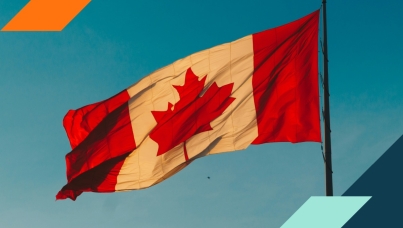On the Razor's Edge: Liberals (32%) And Conservatives (31%) In Virtual Tie Conservative Minority Looms As Ontario Tilts Tory
This is reflective of the national vote which currently has the two parties in a virtual tie with 32% for the Liberals (down 2 points) and 31% for the Conservatives (up 1 point).
The last time the Liberals were at 32% in the opinion polls was in January, 1991.
Meanwhile, Jack Layton and the New Democratic Party (17%, up 1 point) and Jim Harris and the Green Party (6%, unchanged) hold steady in the national polls, while 3% of decided voters would cast their support for some "other" party. In the province of Quebec, the Bloc Quebecois (45%, up 1 point) continue to control the largest portion of federal vote support, leading the Liberals (28%, down 1 point) by 17 points in this province.
Among all Canadians, 11% are undecided or would not vote if an election were held tomorrow (down 1 point).
The battleground that is shifting towards the Conservatives is in seat rich Ontario where the Conservatives are at 35% (down 1 point), the incumbent Liberals at 32% (down 4 points), and the NDP at 23% (up 2 points). This latest poll represents the first time since June 1985 that the federal Conservatives appear to lead the federal Liberals in the province of Ontario. Further, the current Liberal standings represent a plummet in the polls since May 7-13th where they recorded support at 49% in the polls - now down 17 points since that date.
An exclusive seat model prepared for CTV and the Globe and Mail by Ipsos-Reid suggests that with the stronger tilt toward the Tories in Ontario the Conservatives have a seat projection range of 46-50 seats in this province compared with the Liberals who have between 49-53 seats, and the NDP between 5-9 seats.
Of note, the seat projection model is now pointing to the potential of two Green Party seats in British Columbia.
When it comes to the focal question of whether the "federal Liberals deserve to be re-elected under the new leadership of Paul Martin" the numbers are unchanged. Three in ten (29%) Canadians answer that they are deserving (unchanged) - compared to 64% of Canadians who say "the Liberal Party does not deserve to be re-elected and it's time for another Federal political party to be given a chance to govern the country" (down 2 points).
When considering the momentum of the various parties and their leaders, Canadians give Jack Layton and the New Democratic Party +15 (unchanged) the highest gap momentum score (calculated by subtracting those who say their opinion has worsened from those who say their opinion has improved), followed by Stephen Harper and the Conservatives (+14, down 4 points). Paul Martin and the Liberal Party continue to have very negative momentum coming in with a gap momentum score of -35 (up 1 point). In Quebec, Gilles Duceppe and the Bloc Quebecois score a strong momentum score of +16 (down 1 point).
These are the findings of an Ipsos-Reid/CTV/Globe and Mail poll conducted between June 1st and June 3rd, 2004. For the telephone survey, a representative randomly selected sample of 1000 adult Canadians was interviewed. With a sample of this size, the results are considered accurate to within 177 3.1 percentage points, 19 times out of 20, of what they would have been had the entire adult Canadian population been polled. The margin of error will be larger within regions and for other sub-groupings of the survey population. These data were weighted to ensure the sample's regional and age/sex composition reflects that of the actual Canadian population according to the 2001 Census data.
Liberals (32%, -2) and Conservatives (31%, +1) Essentially Tied - In Ontario: Conservatives (35%, -1) And Liberals (32%, -4)
If a federal election were held tomorrow, Paul Martin and the Liberal Party would garner 32% of the decided vote (down 2 points) while Stephen Harper and the Conservative Party would attract the support of 31% of decided voters (up 1 point). Meanwhile, Jack Layton and the New Democratic Party (17%, up 1 point) and Jim Harris and the Green Party (6%, unchanged) hold steady in the national polls, while 3% of decided voters would cast their support for some "other" party. Gilles Duceppe and the Bloc Quebecois have 11% of the national decided vote -- in the province of Quebec, the Bloc Quebecois attracts 45% of decided votes (up 1 point), leading the Liberals (28%, down 1 point) by 17 points in this province.
Among all Canadians, 11% are undecided or would not vote if an election were held tomorrow (down 1 point).
- The Conservatives have 35% of decided voter's support (down 1 point) in Ontario, while the Liberals have 32% of decided voter's support (down 4 points). The NDP trail further behind the pack with approximately one-quarter of the decided vote. The Green Party follows distantly with the support of one in twenty decided votes.
- In Quebec, a 17 point margin separates the Bloc Quebecois (45%, up 1 point) from the Liberals (28%, down 1 point). The Conservatives and the NDP register low on the federal radar screen in this province.
- In British Columbia, the Liberals (32%, down 2 points) and the Conservatives (31%, down 8 points) are tied, while the NDP trails the pack with 23% of the decided votes (up 9 points). The Green Party has 13% of decided votes in this province (up 2 points).
- In Alberta, the Conservatives (50%, up 1 point) hold a 23 point lead over the Liberals (27%, unchanged). The NDP is a distant third with one in seven decided voter's support, and the Green Party comes in fourth with one in ten decided voter's support.
- In Saskatchewan/Manitoba the Conservatives have bounced back into the lead with 45% of decided voter's support (up 15 points), with the Liberals trailing at 38% decided voter's support (up 2 points). The NDP is further back with 13% of decided voters support (down 11 points).
- In Atlantic Canada the Liberals hold a commanding 15 point lead with 46% of the decided vote (down 2 points), the Conservatives come in second with 31% (up 7 points) of decided voter support, and the NDP come in third with 21% of decided voter support (down 3 points).
A majority of Canadians (64%, down 2 points) believe the statement "the Liberal Party does not deserve to be re-elected and it's time for another Federal political party to be given a chance to govern the country" is closest to their own opinion, compared to 29% (unchanged) who believe the statement "the Liberal Party deserves to be re-elected under the new leadership of Paul Martin" is closest to their own opinion. The remaining 6% of Canadians "don't know" which statement is closest to their own opinion.
- Agreement with the statement "the Liberal Party does not deserve to be re-elected and it's time for another Federal political party to be given a chance to govern the country" is highest in Quebec (70%) and Alberta (69%), followed by Ontario (64%), British Columbia (61%), Saskatchewan/Manitoba (55%), and Atlantic Canada (53%).
- Agreement with the statement "the Liberal Party deserves to be re-elected under the new leadership of Paul Martin" is highest in Atlantic Canada (40%), followed closely by Saskatchewan/Manitoba (36%), British Columbia (32%), Ontario (29%), Quebec (26%), and Alberta (25%).
- Nearly one in five decided Liberal supporters (17%) believe it's time for a change in government, compared to 95% of Conservative supporters, 83% of NDP supporters, and 88% of Bloc Quebecois supporters.
Canadians were asked whether their opinions of the various major parties and their leaders has improved, stayed the same, or worsened over the last few weeks:
- Three in ten Canadians (32%) say their opinion of Stephen Harper and the Conservative Party has improved over the last few weeks (13% "strongly improved", 20% "somewhat improved"), 40% say their opinion has "stayed the same", and 18% say their opinion has worsened (9% "somewhat worsened", 8% "strongly worsened"). The remaining 10% of Canadians "don't know" if their opinion has changed.
- Another three in ten (28%) say their opinion of Jack Layton and the New Democratic Party has improved over the last few weeks (9% "strongly improved", 19% "somewhat improved"), 44% of Canadians say their opinion has "stayed the same", and 13% say their opinion has worsened (8% "somewhat worsened", 5% "strongly worsened"). The remaining 15% of Canadians "don't know" if their opinion has changed.
- One in ten Canadians (13%) say their opinion of Paul Martin and the Liberal Party has improved over the last few weeks (4% "strongly improved", 9% "somewhat improved"), 34% say that it has "stayed the same", and 48% say it has worsened (25% "strongly worsened", 23% "somewhat worsened"). The remaining 5% of Canadians "don't know" if their opinion has changed.
- In Quebec, one-quarter (23%) say their opinion of Gilles Duceppe and the Bloc Quebecois has improved (9% "strongly improved", 15% "somewhat improved"), 61% say their opinion has stayed the same, and 7% say their opinion has worsened (4% "somewhat worsened", 3% "strongly worsened"). The remaining 9% of Quebecers "don't know" if their opinion has changed.
- Jack Layton and the New Democratic Party have the strongest momentum in Atlantic Canada (+35, up 9 points), followed by Ontario (+18, unchanged), British Columbia (+12, up 9 points), Alberta (+9, up 4 points), and Quebec (+9, down 5). However, Jack Layton and the NDP have negative momentum in Saskatchewan/Manitoba (-2, down 19 points). Among NDP decided vote supporters, Jack Layton and the NDP score a +58 (down 5 points).
- Stephen Harper and the Conservatives have the strongest momentum in Alberta (+24, down 9 points), followed by Ontario (+17, up 1 point), Quebec (+15, up 3 points), Atlantic Canada (+12, down 3 points), British Columbia (+8, down 22 points), and Saskatchewan/Manitoba (+5, up 1 point). Among Conservative decided vote supporters, Stephen Harper and the Conservatives score a +66 (up 2 points).
- Paul Martin and the federal Liberal Party have negative momentum in every region of the country: Saskatchewan/Manitoba (-13, up 15 points), Atlantic Canada (-30, down 9 points), Alberta (-31, up 2 points), British Columbia (-33, down 1 point), Ontario (-38, down 3 points), and Quebec (-41, up 6 points). Among Liberal decided vote supporters, Paul Martin and the Liberals score a +9 (up 2 points).
- Gilles Duceppe scores a +16 in Quebec (down 1 point), and among Bloc Quebecois decided vote supporters Mr. Duceppe and the Bloc Quebecois score +33 (down 11 points).
In an exclusive seat projection model provided to CTV and The Globe and Mail, if a vote were held tomorrow, the Liberals would have a potential of 115-119 seats, the Conservatives would have a potential of 110-114 seats, the NDP would have a potential of 17-21 seats, the Bloc Quebecois would have a potential of 56-60 seats, and the Green Party may gain a possible 2 seats. In order to achieve a majority government, a party needs a minimum of 155 seats in the House of Commons.
For explanation of the projected seat range model please visit:http://www.ipsos-na.com/news/pressrelease.cfm?id=2197 Please open the attached PDF to view the factum and detailed tables.
-30-
For more information on this news release, please contact:
Darrell Bricker
President & C.O.O.
Ipsos-Reid Public Affairs
(416) 324-2900



